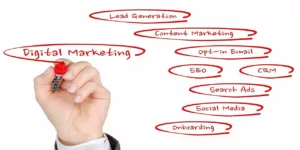There are several digital marketing avenues available on the internet that are sure to add to the success of your online company. Every online firm needs to take advantage of these resources in order to promote its products and services and generate traffic that will eventually convert into solid leads. However, depending on your business model and your ideal customers, there may be particular platforms and strategies that are better suited to your needs and you may need to eliminate those streams that are simply not working. Here are a few questions that you should ask yourself to improve your digital marketing campaign:
Do you spend time focusing on non-buyers?
Why would you waste valuable resources, such as time and money, on those that are not already loyal customers? That’s easy to figure out. Not every person that turns away from your ads does so because they are not interested. Many feel that they may benefit from your product or service, but they lack the time, money, or knowledge to get started. They may even be a bit cautious; since it is hard to trust someone online that is miles away and that they never have met. A good digital marketing campaign is designed to assuage those fears and convert these skeptical leads into brand loyalists.
Also, when such would-be customers reach out, did you address their questions and concerns? Always follow-up with queries on social media, on your web site, and in direct emails. It is a well-known fact that approximately 80 percent of business opportunities are lost due to a lack of following up. Customer support should be on-call to handle these and any issues online regardless of whether the person is a paying client at the moment or not.
Do you build human connections?
There are many methods in which you can add a human touch to a campaign that is otherwise on digital autopilot. You can add first-person customer reviews to your webpage, a la Amazon, to give your potential leads a window into what it is like for a real person to use your product or service. Remember, it is best not to censor critical reviews, as this can appear as though you are hiding something. Instead, address these issues with customers directly, and vow to improve those areas that others may have had a concern about in the past.
You can also take the time to build an audience with a blog on your website or by following up with your email list to see if those who have purchased from you in the past have any feedback, whether it is positive or a critique. You should also blatantly thank your customers on their chosen social media platform for each re-tweet, like, pin, or share, and show your sincere gratitude for their support.
Do you analyze your KPIs (Key Performance Indicators)?
Your KPIs are designed to give you a fair and unbiased assessment of which digital campaigns are working for you and which are not converting a fair amount of leads. Be sure that you understand what each specific term means in the course of your campaign. For example, your landing page conversion rate is an indicator of how many customers read your page all the way through and end up buying your product or service or simply doing the action that is required of them (i.e. providing their email address or re-tweeting, etc.), while a CTR, or click-through rate, is the number of people that are actually clicking on your ads. It is important to know what each metric is measuring, and then to use this information provided to your strategic advantage. Do you need to completely change your process? Do you want to distribute your resources to a different platform? You need to analyze the data to find out what is best for you.
Do you have a strategic outreach plan in place?
In order for you to be able to reach your ideal potential customer, you need to spend some time lurking on the internet and studying them. No matter who they are, research their needs and what they like and dislike about life in general. This will assist you with presenting your company as a solution to a particular, niched problem that they may be experiencing (never get too broad right away). Hang out where they digitally hang out – Twitter, Facebook groups, message boards, Reddit, etc., as this is where they will be most comfortable and honest. Use these platforms to then launch your campaigns directly to those that are most likely to bite.
Let these potential leads know how your product is better than similar products that you may have heard them offer complaints about previously. After all, immediately knowing the frustrations and concerns of your target customer is one special advantage that online (and hybrid) companies have over brick-and-mortar-only businesses.
Once you have a better understanding of your customers you can ramp things up and integrate simple marketing automation. Automating these things will allow you to scale things quickly and better understand the value of each marketing dollar spent.
In conclusion, it isn’t always easy to admit that a strategy that you put a lot of time, money, and effort into isn’t working, but this knowledge is important to your company’s overall success. Using marketing strategies that have the strongest potential to convert casual fans into paying customers is always the ultimate goal, and asking yourself these questions should put you on the right path.








